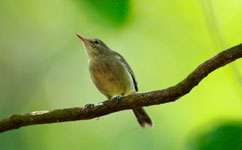Help at the nest sets chicks up for life

The help that relatives give to nesting birds benefits their offspring well into adult life, researchers have found.
A chick's chances throughout life will depend on a good environment and good parenting in its earliest months.
One of the ways that chicks can get ahead is to have an extra relative looking after them. New research shows that the benefits of having a 'helper at the nest' extend even into adulthood.
"It is a paradox that individuals help to rear others instead of breeding on their own," explains Dr. Lyanne Brouwer of the Australian National University. "But classic theory explains this by 'kin-selection'; by helping to raise relatives, helpers indirectly pass on a part of their own genes. The benefits that an individual gains can be calculated in terms of the number of genes that they pass on to the next generation."
Calculations like this can help us understand why some species of bird help out at relatives' nests whilst other species do not. In their article in PLoS One, Brouwer and her colleagues argue that the long-term benefits to bird survival from having a friendly relative on hand need to be borne in mind when making these calculations.
The scientists studied the Seychelles warbler, found only in a few islands in the Republic of Seychelles in the Indian Ocean. This is one of the nine per cent of bird species that are classed as cooperative breeders. Their limited habitat, bounded on every side by the sea, often forces related birds to share the territory they grew up in.
"Once all the habitat on the island is occupied, new young have nowhere to go to, so they stay with their parents and often help to rear the next brood," says Brouwer. "The Seychelles warbler is a typical example of a cooperative breeder."
The scientists think that the effects of good parenting and having a helper matter more for the Seychelles warbler's chance of survival than the local environment. They suggest that part of the reason for this is that because the warblers live in tropical ecosystems, food shortages and temperature changes are not as extreme as they are in cooler climates.
Brouwer and her colleagues considered two possible reasons why helpers are so beneficial right through life. It may be that the chicks get more food, and therefore have a greater body mass when they fly the nest. As heavier chicks have a better chance of survival, the additional food may have a long-lasting benefit.
Alternatively, by bringing more food to the growing chicks, chicks may not have to forage as much. The reduction in foraging effort required by the chicks keeps them safe from damage to their cells, which could cause later diseases. Further research is needed to test these ideas, so research is continuing in the Seychelles.
"The Seychelles warbler population on Cousin Island has been studied since 1986 and is therefore a great study system to answer questions like these," says Brouwer. "Also, since the warblers always stay on their little island, we can safely say that if we don't see an individual anymore, then it must be dead. This means we can estimate survival really accurately."
The researchers couldn't just rely on historic data sets. There are many things that may complicate an experiment into the effect of helpers on offspring performance. The strongest, best-developed birds might hold onto the largest territories with lots of adult helpers. They may have really good genes that they pass on to their offspring, who, unsurprisingly, do better. The scientists got round this by cross-fostering – that is, swapping nestlings around between nests.
"Cross-foster experiments separate the rearing from the effects of genetic quality," Brouwer elaborates. "If there are any effects of helpers on survival, rather than these young being of higher genetic quality, we would expect an impact of the number of helpers of the rearing territories, not the original territories, on the survival of cross-fostered offspring."
More information: Lyanne Brouwer, et al., Helpers at the Nest Improve Late-Life Offspring Performance: Evidence from a Long-Term Study and a Cross-Foster Experiment. PLoS One, 7(4):e33167, published April 4th 2012. doi:10.1371/journal.pone.0033167
Journal information: PLoS ONE
Provided by PlanetEarth Online
This story is republished courtesy of Planet Earth online, a free, companion website to the award-winning magazine Planet Earth published and funded by the Natural Environment Research Council (NERC).



















